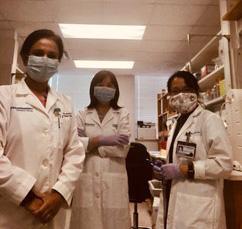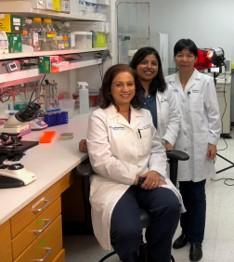Our laboratory is focused on neonatal innate immunity and interaction with the developing microbiome. Our overarching goal is to develop therapies for optimizing neonatal health and preventing neonatal diseases, including necrotizing enterocolitis (NEC) and sepsis. NEC is a multifactorial disease with high morbidity and mortality that affects ~2 million preterm infants globally and carries an annual healthcare burden of US$5 billion. There are currently no directed therapies to prevent NEC.
We do both basic science and translational research focused on unraveling how maternal nutrition, in particular, maternal high fat diet (mHFD), and neonatal diet predispose to NEC. We are currently focused on investigating the role of the microbiome, diet, dietary metabolites, and inflammation in regulating group 3 innate lymphoid cells (ILC3) in the developing gut in murine models and in human neonatal intestinal tissue. Our long-term goal is to bridge a critical gap in understanding the pathogenesis and identify novel targets to prevent NEC.
Methods used in our laboratory span metabolomics, flow cytometry and single cell analysis. We also perform next generation sequencing of the microbiome and perform complex bioinformatics with the help of our collaborators. We perform flow cytometry on fresh intestinal tissue from mice and human preterm infants to establish the role of gestational age and diet in ILC3 development.
We have an outstanding team that works passionately and diligently to investigate novel therapeutic targets to optimize the health of the very vulnerable babies that are born too early. We also hope to develop therapies that lead to the prevention of neonatal diseases that are programmed in utero by maternal diet, altered bacterial colonization and ILC3 development.
We are dedicated to having an open and engaging lab environment that will allow everyone to be valued and find joy in their work. Please feel free to contact us and explore the possibilities.

